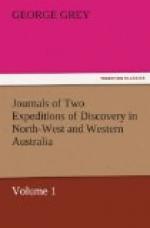Nothing can give a more lively notion of the difficulties and privations undergone by first settlers than the fact that, when I left this hut, they had no flour, tea, sugar, meat, or any provision whatever except their livestock and the milk of the cattle, their sole dependence for any other article of food being the kangaroo dogs, and the only thing I was able to do in order to better their situation was to leave them some shot.
All other circumstances connected with their position were on the same scale. They had but one knife, an old clasp one; there was but one small bed for one person, the others sleeping on the ground every night, with little or no covering; they had no soap to wash themselves or their clothes, yet they submitted cheerfully to all these privations, considering them as necessary attendants upon their situation. Two of these out-settlers were gentlemen, not only by birth but also in thought and manner, and, to tell the truth, I believe they were far happier than many an idle young man I have seen lounging about in England, a burden to himself and his friends; for it must be borne in mind that they were realizing a future independence for themselves.
THEIR PRIVATIONS.
Many of the ills and privations which they endured were however unnecessary, and were entailed upon them by the mistaken system that has been pursued at Swan River of spreading to the utmost their limited population. I trust however that a wiser line of policy will now be pursued, and that settling will consequently become an easier, less dangerous, and far more agreeable task.
ROUTE ALONG MR. ELLIOTT’S TRACKS. TRACKING MR. ELLIOTT.
On the morning of the 16th Mr. Walker went to the Upper Williams, where the soldiers were quartered, for a further supply of provisions, whilst the native and myself tried to make off Mr. Elliott’s tracks, in doing which we were not however successful. The next morning, previously to Mr. Walker’s return, I renewed my search with Kaiber for the tracks with a little more success, as amidst the numerous traces of cattle and horses along the bed of the river the native was able by his acute eye to discover the footsteps of a colt. When Mr. Walker returned the little boy belonging to the establishment came back with him. He had seen Mr. Elliott start and assured me that he had heard him express his determination of keeping the bed of the river for eighteen miles. With this piece of information we moved on down the river on the tracks which we were able to distinguish for about two miles and a half, when they quitted it in a south-south-west direction; and from the hard nature of the ground the tracking from thence became excessively difficult. If the colt had traversed this route, its little foot had made no impression on the soil; and when we got on the ironstone hills, we altogether lost the traces of the horse. Both the native and myself imagined, from our seeing no tracks of the colt, from the indistinctness of those of the horse, and from the circumstance of the boy’s telling us that Mr. Elliott intended to proceed eighteen miles down the river, that we had followed the wrong marks; just therefore as night began to fall I moved back to the river.




